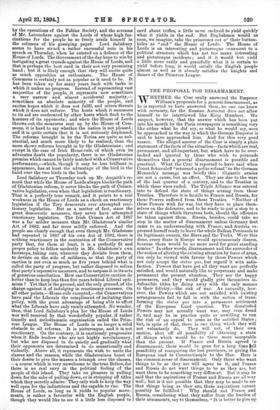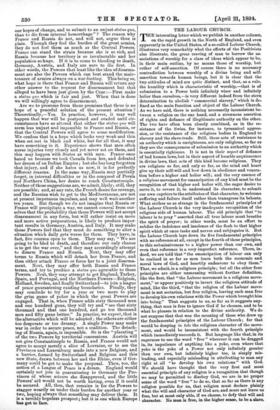THE PROPOSAL FOR DISARMAMENT.
1WHETHER the Czar really answered the Emperor William's proposals for a general disarmament, as he is reported to have answered them, no one can know with certainty, for the Russian Autocrat does not allow himself to be interviewed like King Humbert. We suspect, however, that the answer which has been put into his mouth by the Paris newspapers is something very like either what he did say, or what he would say, were he approached in the way in which the German Emperor is said to have approached him. And for this very good reason. The alleged answer of the Czar is simply a plain statement of the facts of the situation—facts which are real, permanent, and all-important, but which have to be over- looked and ignored by those who wish to persuade themselves that a general disarmament is possible and practical. What the Czar is reported to have said when Count Schuvaloff "returned a polite refusal" to the German Monarch's message was briefly this : Gigantic armies are not a cause, but an effect. They are due to the wars of the last quarter of a century, and to the Treaties in which these wars ended. The Triple Alliance was entered into to defend the state of things arising from these Treaties. Therefore it is hostile to France and Russia, for these Powers suffered from these Treaties. "Neither of these Powers wish for war, but they have to place them- selves on the defensive, and to be ready to put a stop to a state of things which threatens both, should the offensive be taken against them. Russia, besides, could take no step in the matter of disarmament unless Germany first came to an understanding with France, and Austria, ex- pressed herself ready to leave the whole Balkan Peninsula to its legitimate owners, the Slays and the Turks. Were this done, every State in Europe would spontaneously disarm, because there would be no more need for great standing armies." In other words, disarmament and the surrender of the notion of altering the existing situation by force of aims, can only be viewed with favour by those Powers which not only accept the status quo, but regard it with satis- faction. Powers that have got all they want are perfectly satisfied, and would naturally like to perpetuate and make permanent the present situation. They are the happy possessors, and they would gladly give themselves in- defeasible titles by doing away with the only menace to their felicity,—the risk of war. As naturally, how- ever, the Powers which are not satisfied with existing arrangements fail to fall in with the notion of trans- forming the status quo into a permanent settlement of the European Land question. The dissatisfied Powers may not actually want war, may even dread it, and may be in practice quite as unwilling to run the risk of an appeal to arms as the satisfied States ; but, in spite of that, there is one thing which they will not voluntarily do. They will not, of. their own motion, shut off all possibility of obtaining a state of things which would be to them more acceptable than the present. If France and Russia agreed lo disarmament, there would be gone for a long time lall possibility of reacquiring the lost provinces, or giving the European road to Constantinople to the Slay. Here is the common-sense of disarmament. Only those who want things to be as they are will agree to it, and France and Russia do not want things to be as they are, but want them to be something very different. But it may be said that the aspirations of France and Russia are all very well ; but is it not possible that they may be made to see that things being as they are, these aspirations cannot possibly be fulfilled ? Why should not France and Russia, considering what they suffer from the burden of their armaments, say to themselves," It is better to give up _ . our hopes of change, and to submit to an unjust status quo, than to die from internal hemorrhage" ? The reason why France and Russia do not, and will not, argue thus is plain. Though they feel the burden of the great armies, they do not feel them as much as the Central Powers. France can stand the strain because she is so rich, and Russia because her territory is so invulnerable and her population so huge. If it is to come to bleeding to death, Germany, Austria, and Italy are sure to die first. In other words, the Powers that least like the idea of disarma- ment are also the Powers which can best stand the main- tenance of armies always on a war-footing. This being so, what hope is there that France and Russia will return any other answer to the request for disarmament but that alleged to have been just given by the Czar :—First make a status quo which is fair and just. When that is done we will willingly agree to disarmament.
Are we to presume from these premises that there is no hope of a peaceful solution of the present situation ? Theoretically,—Yes. In practice, however, it may well happen that war will be postponed and evaded until cir- cumstances have so altered that either the status quo will seem less unjust and impossible to France and Russia, or that the Central Powers will agree to some modification. We confess that is a hope which looks very weak and thin when set out in black and white, but for all that, it may have something in it. Experience shows that men often nurse injuries very closely and yet never act on them, and this may happen with States as with men. France once hated us because we took Canada from her, and defeated her dream of an Indian Empire; but she has long forgotten that injury, and if she hates us now, it is for perfectly different reasons. In the same way, Russia may partially forget, in internal difficulties or in the conquest of Persia and Northern China, her desire to reach Constantinople. Neither of these suggestions are, we admit, likely; still, they are possible; and, at any rate, the French desire for revenge, and the Russian wish to get to the Mediterranean, are not at present impetuous impulses, and may well wait another ten years. But though we do not imagine that Russia or France will precipitate a war, we cannot conceal from our- selves that the probability that those Powers will not accept i disarmament n any form, but will rather insist on more and more active preparations, is likely to produce impor- tant results in Germany, Austria, and Italy. It may make those Powers feel that they must do something to alter a situation which daily gets worse for them. They have, in fact, five courses open to them. They may say, "We are going to be bled to death, and therefore our only chance is to get the war over," and they may accordingly attempt to disarm France and Russia. Next, they may offer terms to Russia which will detach her from France, and then either attack France or force her to a joint disarma- ment. Next, they may offer both Russia and France terms, and try to produce a status quo agreeable to these Powers. Next, they may attempt to get England, Turkey, Spain and Portugal, and the Northern Powers—Belgium, Holland, Sweden, and finally Switzerland—to join a league of peace guaranteeing existing boundaries. Finally, they may conclude to try for a year or two more to play the grim game of poker in which the great Powers are engaged. That is, when France adds sixty thousand men and one hundred guns, they will try and "see that sixty thousand and that one hundred, and go ten thousand men and fifty guns better." In practice, we expect, that is the alternative which will be adopted ; the others are either too desperate or too dreamy. A single Power may make war in order to secure peace, not a coalition. The detach- ing of Russia, again is impossible. So is the " placating " of the two Powers by territorial concessions. Austria will not give Constantinople to Russia, and France would not agree to accept merely a slice of Lorraine, or to see the Provinces and Luxemburg made into a new Belgium, and a barrier, formed by Switzerland and Belgium and this new State, drawn between her and the Rhine, even if Ger- many could be got to make the proposal. Then, too, the notion of a League of Peace is a dream. England would certainly not join in guaranteeing to Germany the Pro- vinces of whose seizure she disapproved, and the little Powers' aid would not be worth having, even if it could be secured. All, then, that remains is for the Powers to stagger wearily on under their burden for another year or two, hoping always that something may deliver them. It is a terribly hopeless prospect; but it is one which Europe has got to face.



































 Previous page
Previous page